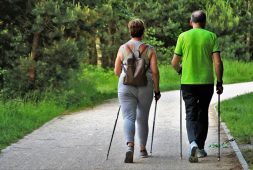
If the cacophony of traffic outside your windows is causing you distress, there are a couple of solutions that can provide relief. Using ear plugs or noise-canceling headphones can help drown out the unwanted noise. Moreover, recent research has validated the notion that both noise pollution and air pollution can have detrimental effects on heart health.
The relentless wails of sirens, the incessant blaring of horns, and the thunderous rumble of massive diesel trucks—most people would unanimously agree that the noise from the roads can be highly bothersome. However, a study recently published on March 22 in the journal JACC: Advances has discovered that this road noise may not only be an annoyance but also a potential hazard to your well-being. The study revealed a significant association between persistent road noise and an increased risk of developing high blood pressure, which is a major risk factor for heart attacks and strokes.
While previous studies have already established a link between loud road noise and hypertension, the connection was somewhat obscured due to the coexistence of noise pollution and air pollution. However, this new study took that into account and managed to isolate the impact of noise alone on health. The results were conclusive—the risk of hypertension persisted even after controlling for the effects of air pollution, as stated by the authors of the study.
“We are a little bit surprised that the association between road traffic noise and hypertension was robust even after adjustment for air pollution,” said lead author Jing Huang, PhD. She is an assistant professor in the department of occupational and environmental health sciences in the School of Public Health at Peking University in Beijing, China.
Dr. Huang notes that the 2021 European Society of Cardiology Guidelines on cardiovascular disease prevention have already emphasized the role of environmental exposures, such as excessive noise levels, in potentially elevating the risk of heart disease.
Almost 50 Percent of Adults in the US Suffer from High Blood Pressure
Blood pressure is a straightforward indicator of the force exerted by blood on the arterial walls. Prolonged high blood pressure can lead to organ damage, including the heart, brain, kidneys, and eyes.
According to the Centers for Disease Control and Prevention, nearly half of adults in the United States (116 million people, or 47 percent) have hypertension. Hypertension is characterized by a systolic blood pressure exceeding 130 millimeters of mercury (mmHg) or a diastolic blood pressure exceeding 80 mmHg. Even if your blood pressure improves with medication, a diagnosis of hypertension still remains in place.
The Louder the Noise on the Road, the Greater the Risk
In order to conduct this prospective study, a group of researchers examined data from the UK Biobank, which consisted of nearly 250,000 individuals aged 40 to 69 who initially did not have hypertension.
Using the Common Noise Assessment Method, a modeling tool developed by the European Commission, the investigators estimated the level of road traffic noise based on the participants’ residential addresses.
After monitoring the participants for a median duration of 8.1 years, the researchers observed that over 21,000 individuals had developed high blood pressure. The study revealed a significant association between living in proximity to road traffic noise and the likelihood of developing hypertension. Moreover, the findings indicated a “dose-dependent relationship,” meaning that a higher amount of road noise corresponded to a greater risk of hypertension.
“This is an interesting study because it is looking into a relationship that we typically don’t think of when thinking about high blood pressure, which is the impact of noise level and air pollution on high blood pressure,” says Jim Liu, MD. He is a cardiologist at The Ohio State University in Columbus and he was not part of the research.
“In theory, this relationship could make sense, since increased noise or pollution could increase stress on the body and cause elevations in blood pressure. Long-term noise stimulation could cause increased stress on the body,” he added.
According to Dr. Liu, any factor that induces stress in the body can potentially impact blood pressure through a range of physiological responses. These responses may include the activation of the sympathetic nervous system, heightened inflammation, or fluctuations in the hormones released by the adrenal glands.
People Exposed to Air Pollution and Traffic Noise Had the Highest Risk
Even after adjusting for exposure to air pollutants, including fine particles and nitrogen dioxide, researchers found that these associations remained valid. The study participants who experienced high levels of both traffic noise and air pollution had the greatest risk of developing high blood pressure, indicating that air pollution also plays a significant role, as stated by the authors.
According to the Global Burden of Disease (GBD) study published in The Lancet in 2020, air pollution was responsible for nine million deaths worldwide in 2019. Among these deaths, an estimated three out of five were attributed to cardiovascular diseases, such as heart attacks and strokes.
A meta-analysis published in The New England Journal of Medicine in November 2021 revealed that levels of particulate matter, which measure the concentration of tiny particles like dust or smoke, are connected to the risk of heart disease, heart attacks, strokes, as well as various cardiovascular risk factors including hypertension and diabetes.
Ewen Chao, MD, an otologist (specialized ear doctor) from Stony Brook Medicine in New York, is in agreement with the findings and he said that these are of interesting and that the study, “does a good job of trying to isolate the effects of traffic noise from other factors. While the effect is small, this paper certainly is a strong addition to a growing literature of studies that supports the correlation of noise and its effects on the cardiovascular system.”
Many Variables That Estimate Noise Exposure Difficult to Measure
The authors acknowledged the limitations to the study, said Dr. Chao. “It uses a model based on the individual’s home address to estimate the noise pollution, which unfortunately cannot account for many variables such as how much time the person actually spends at the home address, and so it cannot precisely measure the true amount of noise exposure,” she added.
It also must be noted that the noise level was only assessed at the start. None was made during the eight-year follow up period, said Liu. “Also, the noise level measured was outdoor noise level and may not necessarily reflect indoor noise level,” he said.
According to the authors, these findings can provide support for implementing public health measures as they validate the detrimental impact of road traffic noise on blood pressure.
Huang suggests that further research is necessary to delve deeper into the physiological mechanisms that may explain the connection between exposure to road traffic noise and hypertension, particularly when considering the presence of air pollutants.
How To Drown Out Road Traffic Noise
Liu suggests that taking measures to minimize traffic noise could effectively mitigate the health impacts associated with road noise, particularly when the noise is severe and significantly bothersome to individuals.
“Noise prevention is very doable, and can include moving away from the noise, turning down the volume of the noise, or blocking the noise, for example, by increasing noise insulation materials, or by wearing hearing protection,” said Chao.
A few examples of hearing protection are earplugs or earmuffs, she suggested. “It is important to find a device that has a good fit in or on the ear. It is also important to look at the noise reduction rating (NRR) [defined at Custom Protect Ear] on a given piece of equipment. A higher NRR will block more sound,” she advised.
According to Chao, certain electronically powered devices also provide active noise cancellation. When sound waves travel through the air and reach your ear canal, they cause your eardrum to vibrate. Chao explains that active noise cancellation functions by generating a counteracting sound wave to cancel out unwanted sounds.
“Noise machines (noise masking) would be less likely to help, as it would only add to the overall volume of noise exposure,” said Chao.



